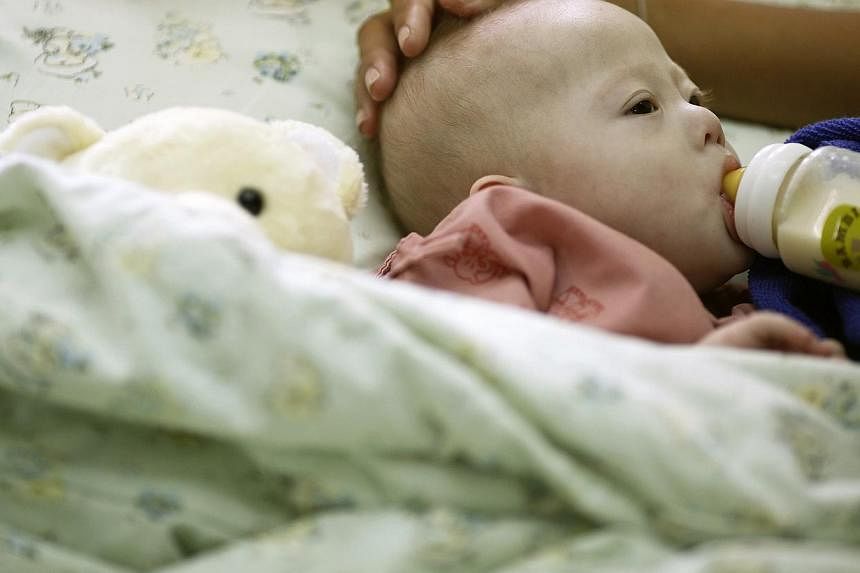PERTH (AFP) - Australian authorities were on Wednesday investigating the father at the centre of a Thai surrogate baby scandal who was exposed as a convicted paedophile, to determine whether his young daughter is at risk.
This comes as medical checks by a Bangkok hospital on baby Gammy confirmed that he is not suffering from a congenital heart defect, contrary to media reports.
The Australian man, from Bunbury south of Perth, sparked global controversy for apparently abandoning his Down syndrome baby boy in Thailand and taking only his healthy twin sister back home, although he and his wife dispute the circumstances.
In another twist to a story that has generated fierce debate on the moral and legal grounding of international surrogacy, reports emerged on Tuesday that the man, who cannot be named for legal reasons, has convictions for child sex offences.
Australian media widely reported that the 56-year-old electrician was convicted for sexually molesting three girls. State broadcaster ABC said he was jailed for three years for molesting two girls under the age of 10 when he was in his 20s. He was also accused in 1997 of another six charges of indecently dealing with a child and reportedly imprisoned for 18 months.
Authorities in Western Australia said they attempted to contact the couple at their home on Tuesday but with a media scrum gathered outside, no one answered the door.
Western Australia Department for Child Protection spokesman Darren O'Malley confirmed to AFP that an investigation had been launched and said another attempt to speak with the parents would be made on Wednesday.
"A full investigation is being conducted into the safety and welfare of the child involved," he said. "We will talk to the people concerned and information will also be gathered from the police and other family members."
Mr O'Malley said that if they could not track down the man and his wife, they "would enlist the services of the police to locate the persons of interest".
"We have the powers to remove children when there is significant and immediate concerns over their welfare," he added. "On the other hand, we could find that there is no need for other action."
The surrogate mother, Pattaramon Chanbua, said she was shocked at hearing of the child sex convictions and was willing to take back the boy's twin sister - aged seven months - if the allegations were true.
"I'm shocked, but I don't know how true it is ... (if it is true) I will try to take the other baby, but that's up to the law," she told AFP on Tuesday.
Ms Pattaramon, 21, has said she agreed to carry another Thai donor's egg fertilised by the Australian man in exchange for around US$14,900.
An agency, which she refuses to name for legal reasons, acted as the go-between. She claims the agency told her the parents wanted her to have an abortion - which is illegal in Thailand - once medical tests revealed the boy had Down syndrome, but she refused.
The Australian couple have disputed her version, claiming they were told Gammy had a congenital heart condition but not Down syndrome, and left him in Thailand because doctors said he would not survive more than a day or so.
But on Wednesday, Vijit Panayingpaisan, a spokesman at Gammy's hospital, said fresh tests on the boy had revealed his heart is in fact in a "good, strong condition".
Thai health authorities say it is illegal to pay for surrogacy in the kingdom and that someone who agrees to carry a baby must be related to the intended parents.
On Tuesday, officials raided the Bangkok clinic where Gammy's mother had the IVF treatment and told AFP they were investigating a doctor there to see if he breached medical ethics, as well as the owner of the clinic.
Commercial surrogacy, in which a woman is paid to carry a child, is not permitted in Australia but couples are able to use an altruistic surrogate who receives no payment beyond medical and other reasonable expenses.
To avoid those curbs, Surrogacy Australia said couples are increasingly going overseas to find women willing to carry their baby, with several hundred each year travelling to India, Thailand and the United States.

